Not as many people today spend a lot of time in the outdoors due to the ever advancing technology that allows people connect with the world at the click of a button. However, there are still some people who still find time to enjoy the outdoors, be it through camping, hiking, backpacking, fishing or even hunting. More and more people are now beginning to seek thrills and experiences away from screens and venture into the woods, so there is a need to be prepared for conditions that affect every outdoor explorer.
Obviously, safety is the number priority and you want to make sure you and your company are safe from any and all dangers that may be out there in the woods. One such danger that you need you need to be prepared for is wild animals and you must know how to avoid wild animal attacks.
Whether you are a newbie or an experienced adventurer, you need to be adequately prepared for any eventuality. Don’t assume that you know everything about any particular area or that you have enough experience to neglect doing any research beforehand.

Even the most experienced outdoorsmen still have to be on their toes when it comes to these things. Wild animals are very unpredictable and you might be facing a life threatening situation at any moment, in a place where you never would have thought any danger was present.
Avoiding wild animals is one thing and surviving a wild animal attack is another thing. It is important you are aware of the methods and practices required to help you avoid wild animals, as well as how to avoid conflict when you actually cross paths with wild animals. This article will talk about these two scenarios and how best to conduct yourself.
Keeping Your Distance and Avoiding Wild Animals
It’s crucial that you are aware of your surroundings and try to have as much information as possible about the area you are hiking across or camping in. You need to know what kinds of animals you are most likely to run into and how dangerous they can be.
Different parts of the country have been known to have different kinds of animals, and with a little checking , you can find out which ones are more common. So many animals pose a different type of threat to you and your company, and knowing what to expect will go a long way in preparing you for any eventuality.
Take bears for instance. They are known to be very dangerous and capable of causing fatal injuries if provoked or intimidated, but if you conduct yourself in a certain manner they might not even notice your presence.
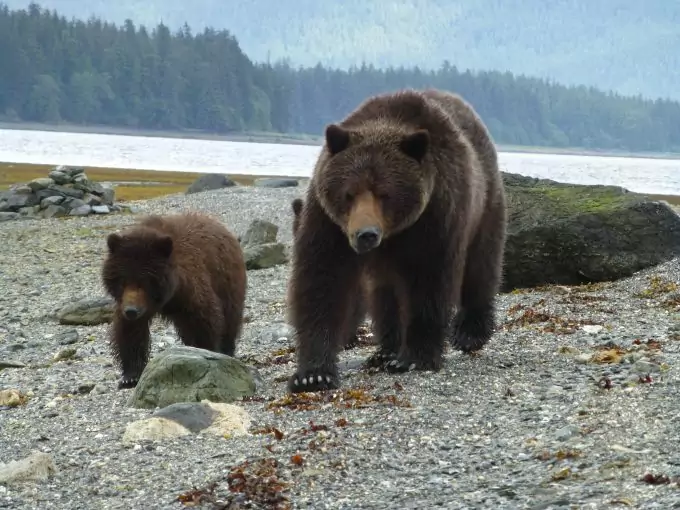
Other animals such as snakes and similar reptiles might not be as easy to stay away from as they can easily hide in holes and in trees, so it is important that you are very vigilant and remain aware of their favored hiding places. Then you have other less threatening animals like coyotes which you can easily scare away, especially if you are in a group or if you have something you can use to shoo them away.
Knowing how to avoid contact and preparing yourself is all down to having the information you need about the area beforehand.
Prevention is always better than cure so it is preferable to avoid conflict and even interaction with these animals as best as you can. If you take certain cautionary measures, you can always keep away from wild animals.
If you see a potential threat, try and keep as much distance between yourself and the animal because if you stay away they won’t be interested in you or what you’re doing. One of the best way to keep this distance between you and the animals is to make sure nothing in your camp will attract them. Keep your camping area as clean as possible and make sure everything is stored properly.
Food is one major attraction of these animals, so it is very important that you store your food the right way and dispose properly of any leftovers. Put them away in animal proof canisters and dispose properly, preferably far away from your camp site.
Also, you should hang up all your food away from your campsite, with something called a bear wire. So if a bear comes close to that area, it is easily distracted by all the food hanging in the air and you are safer in your camp. Also, you shouldn’t take your food into your tents with you.
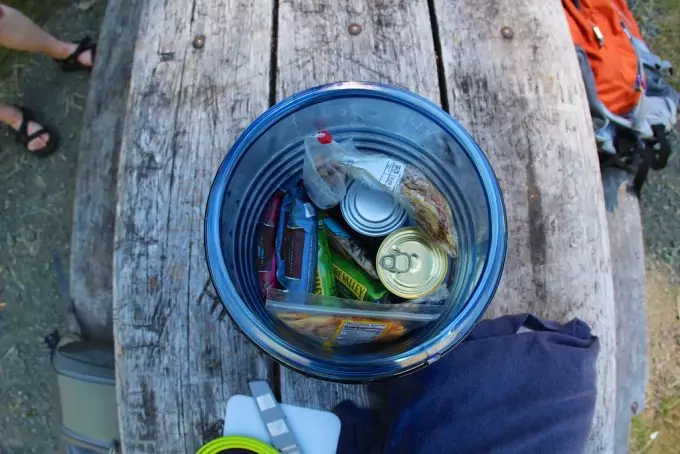
This is one mistake a lot of campers make and it is very dangerous because you can easily attract wild animals into your tent. As a matter of fact you shouldn’t even go into your tents with the same clothes you wore while you were cooking, as they will still have food scents on them. Change into new clothes when going in your tent after dinner.
Now, staying away from wild animals or keeping your distance is one thing, avoiding any form of interaction with any animal even if it is harmless is another. Do not under any circumstance interact with any animal. Take harmless animals like deers, or bunnies.
You might be tempted to feed them and watch them eat but this is dangerous in itself. These are animals of prey and can easily attract other wild animals who are predators on the hunt for a meal. And you don’t want to be in their path when they come around.
Last but not least in the list of preventative measures is to be armed in one way or another. If you have what you need to fend off an animal attack, it will do you much better than just using your bare hands and feet.
You can arm yourself with a knife, a gun, a pepper spray or whatever you feel comfortable in using to defend yourself. Preventive measures are mostly down to preparation and planning so having as much knowledge as you can about that particular area cannot be over emphasized.
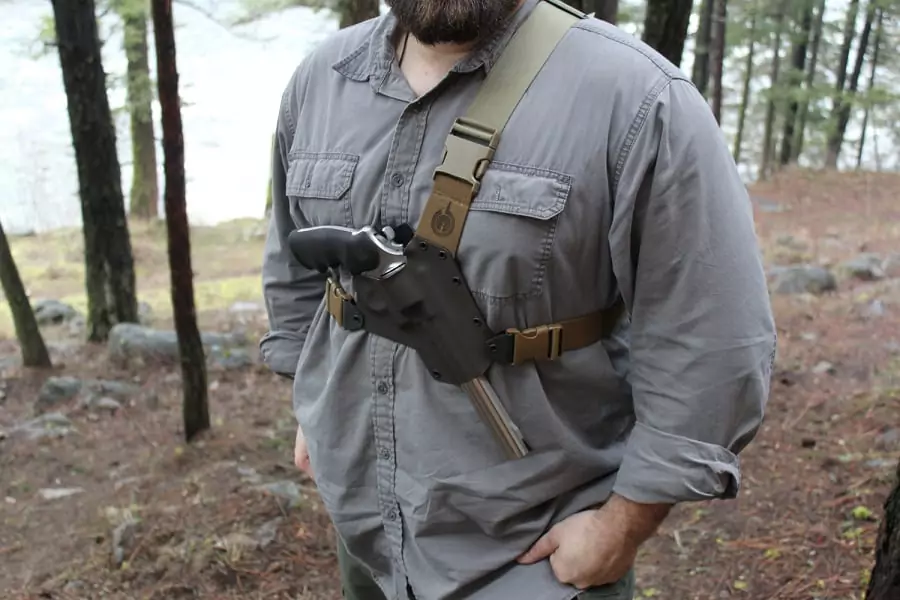
Be sure to read the guidelines of the area you’re camping in beforehand, however. Not all parks or woodlands allow you to bring firearms or to kill the animals that naturally live there. Non-lethal measures are a better option.
Dealing with Wild Animals
There are so many wild animals you can encounter in the woods and it is also very important that you know their behavioral patterns and what they respond to in order to know how best to react in the event of an encounter.
Depending upon the area in which you are camping, you might run into bears, mountain lions, wolfs, coyotes, snakes, crocodiles, deers et cetera. But by far the most popular encounters are with bears, coyotes and deers. So we will be talking briefly about these animals, how they react and how you should react when you cross paths with them.
Bears
There is a very real possibility of running into a bear on your camping trip and you need to understand that all bears are dangerous. Particularly more dangerous are the hungry ones and the nursing mothers who have cubs to protect.
Bears will eat anything because they are omnivores, so they are easily attracted to your refuse. If you do find one in your camp, the worst thing you can do is to surprise them, as they will react on instinct. You need to stay as far away from them as possible, as well as their cubs. Don’t try to play with the cubs or feed them as you can easily land in hot water with their protective mothers.
Bears are also very territorial so they are more susceptible to attack when they feel like you are encroaching into their space or cornering them. If they do find their way to your camp site, do not make sudden moves as this will make them nervous and agitated. You must move as slowly and quietly as possible and gradually move away from their vicinity. If you thought that outrunning a bear is your best option, see our piece on finding out how fast bears can run to find out.
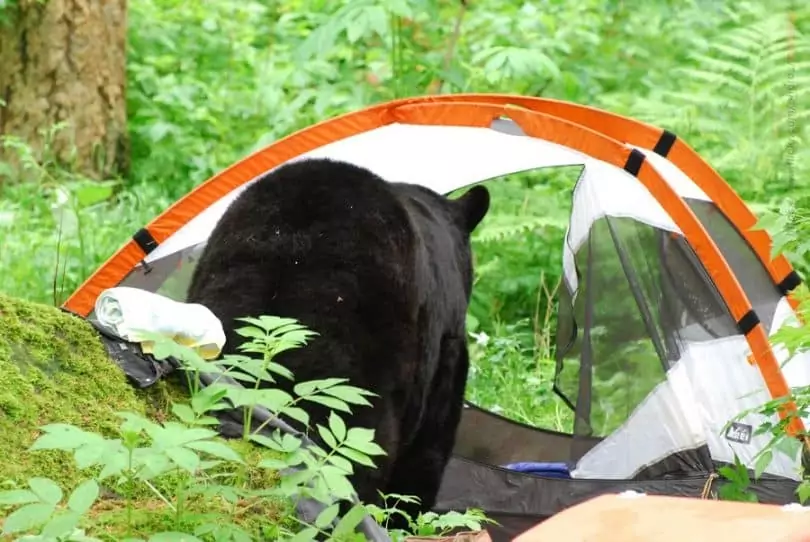
It is also sometimes advisable to make yourself appear bigger than you actually are by waving your arms above your head and making as much noise as possible perhaps by banging pans and other loud stuff together.
However this is only advisable when the bear is very far away from you but still in your space. By making yourself look bigger and making all that racket, they will most likely be fended off and move away from you. It is important that there are many routes in and out of your campsite so that the bear can easily leave, as well as making it easy for you to b escape if need be without having to pass by the bear.
Last but not least, in the event of an attack the best way to survive is to follow some of these steps. First of all you should have bear pepper spray with you. It is very effective in fending them off. Secondly, do not try to run immediately: move away as slowly as possible and avoid eye contact in order not to stress the animal. Here’s our article listing down the top pepper sprays to use on bears, check it out and see.
Lastly, if it continues to come closer to you, lay on the ground and assume a fetal position while covering the back of your neck with your hands. Try and reduce your breathing to a very minimal level and play dead. If you do this long enough, it will lose interest in you and move along.
Wolves
Actually wolves aren’t as aggressive as we often think and there hasn’t been any documented case of a healthy wolf killing anybody in the USA. Mostly people who have been injured by wolves were as a result of habituation. When these animals stay in a certain area for so long they soon become fearless and being instinctive creatures, they can attack when they feel like they are threatened.
The best way to deal with wolves s to make sure there is no interaction between you and them and that your paths do not cross or intersect. You want to make sure your camping area is clean and there is no left over food laying around which can attract them.
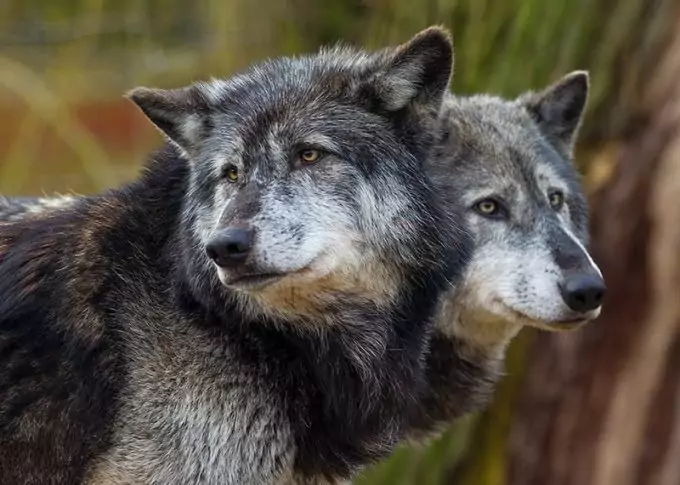
You also want to hang all of your food in a manner that they cant reach it. If you follow these best practices you shouldn’t have any wolf presence around you. Our article on the best odor proof bags for backpacking might do the trick, so read it by clicking the link.
However in the event that you are being attacked or threatened by an aggressive wolf, you need to wave your hands over your head and make as much noise as you can perhaps with pans and metal stuff around you.
This will make you seem bigger and more aggressive and the wolf may back down. Also whatever you do, do not at any point turn your back on the wolf. You need to back away slowly from it while maintaining eye contact. Follow these rules and you should be fine.
Coyotes
Also with coyotes you can follow some of the general rules and guidelines to minimize interaction and stay safe. You want to make sure that your camping area is free of scattered food items that can attract them. Also you should never try to feed them or get too close to them.
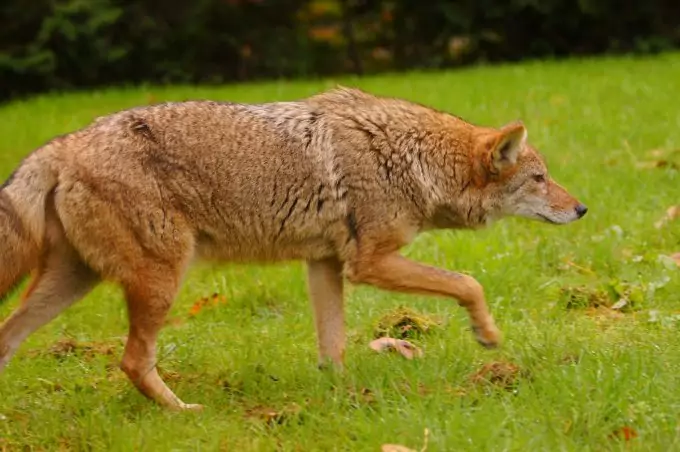
Its best you watch them from afar when you do run into them and in the unlikely event that one of them tries to attack you, follow the same guidelines that have been laid out when dealing with wolves and you should be fine.
Deer
Deers might not be as aggressive or territorial as beers and coyotes, but they are also potential threats to your physical wellbeing if you provoke them. If you corner a deer or make them feel like they or their offspring are in danger, they might fight back and charge at you. The best thing to do is to keep your distance.
If you find yourself in a situation where the deer is charging at you, face the animal and make yourself appear to be bigger than you are by waving your arms above your head and making as much noise as you can. You might get lucky and scare the deer into retreating.
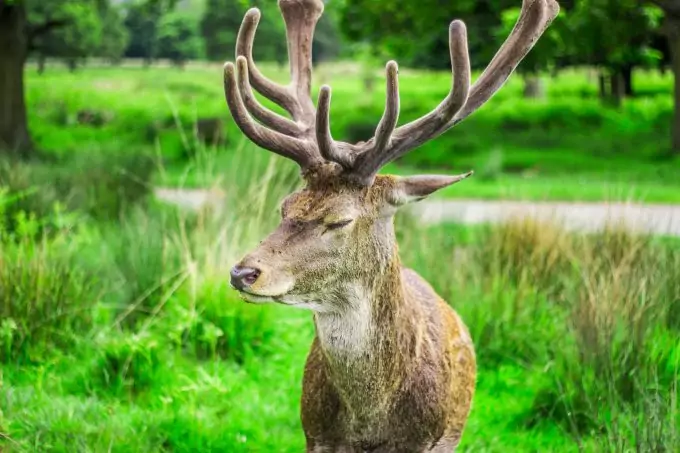
If you can, get to a higher point by climbing a tree or a very large boulder. But if you find yourself on the ground, curl up and cover all your delicate organs with your arms and hands. The deer will eventually leave you alone after a few jabs at you.
Final Words
Animals have certain peculiarities about their movements and the way they attack and defend themselves, so if you know as much as you can about these animals, how to avoid them and how to react to their attacks, you are already a lot safer. Find out more on how to make yourself safe while camping by reading our article dealing with this topic.
Planning is great and all but these animals are very unpredictable and can show up unannounced, so be prepared to take matters into your hands and fight back in whatever way you can.

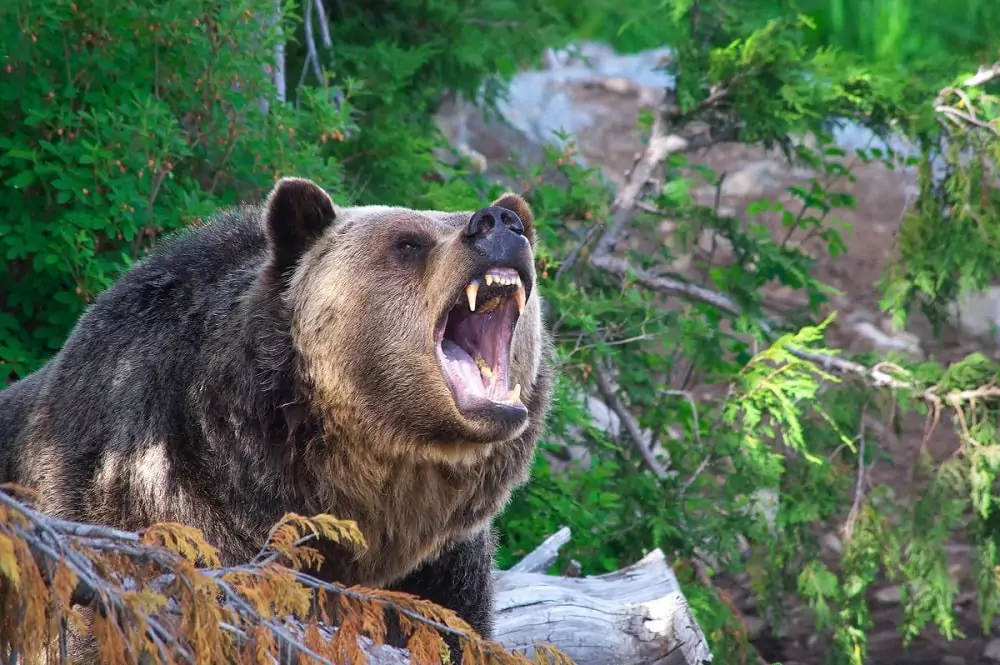
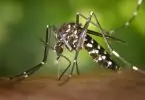

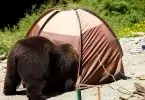
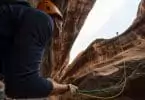


It is very important to understand the animals that inhabit the place you are going to visit and to learn the specific response for each animal. For example, in Yellowstone, there are both grizzly bears and black bears that roam some areas so you should definitely know the difference. So what to do if you run into these bears? Do not even try to outrun or fight back against a grizzly, you need to collapse and play dead. However, if you play dead with a black bear, you would likely get bitten because they are scavengers. You need to make yourself large by raising your arms and yelling loudly. So slowly back away from it while continuing to talk in a loud calm voice and making yourself big.
I remember reading an article before by a guy who was attacked by wolves who advised that the first thing to do is to prevent the situation from escalating by into an attack situation by NOT making any eye contact and NOT showing your teeth. Without turning your back on the wolf, lower your head so the wolf will see you as submissive and non-threatening as you SLOWLY back away. You should also “never run”. Wolves love running after prey.
Thanks for the handy tip, Brian! There are a lot of mishaps concerning wild animals, especially bears. Most have learned to scavenge on campsites so care is needed. Being proactive also helps a lot so make sure you know the area well and don’t be afraid to ask from people who have been there before.
That’s correct! Making eye contact is a sign of aggression so lowering the head signals subservience. I do hope we won’t be in any of these situations, but then again, it pays to be proactive about it. Anything can go wrong in the wild – but isn’t it the same in our urban jungle? Be prepared and equip yourself to increase your chance of survival.